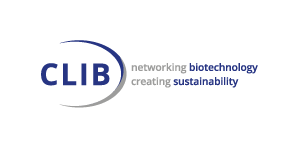
CLIB (Cluster Industrial Biotechnology) is an international open innovation cluster of large companies, SMEs, academic institutes and universities, as well as other stakeholders active in biotechnology and bioeconomy as a whole. The cluster comprises over 100 members with a share of about 25 % international members.
The overall goal of CLIB is to network stakeholders along and across value chains and to identify new opportunities for innovation, projects, and business. Through this, the cluster develops cross-sectoral biotechnological solutions for sustainable processes and products. Pertinent project areas are identified by the CLIB team in conjunction with members in an iterative process. CLIB is a non-profit association, with its members shaping the cluster’s interests and activities. The cluster coordinates several associated programmes which cover different aspects of bioeconomy, and invites members to become involved. To this end, CLIB organises a number of events throughout the year: the annual CLIB international conference (CIC), forum events, topic-specific workshops, dedicated small partnering meetings and visits to partners, sites or meetings in Germany and abroad.
The cluster is involved in a number of national and international initiatives. An NRW-based project is dedicated to improving identification and production of high performance ingredients (HiPerIn2.0) for markets like adhesives, personal care, textiles, or food and feed. This action is funded by the Ministry of Economic Affairs, Innovation, Digitalization and Energy of the State of North Rhine-Westphalia. Together with partners in Germany, Flanders, and the Netherlands, CLIB established the BioInnovation Growth mega-Cluster (BIG-Cluster), which aims at developing novel cross-border value chains based lignocellulose or C1 gases, and develops a cross-border education initiative. Within BIG-Cluster, CLIB is coordinating three ongoing projects: In ALIGN, the consortium aims at producing new low- and high-value aromatics based on lignocellulose. In BioCOnversion, the partners will develop a biotechnological process for CO/CO2 gas conversion. In CROSSBEE, a cross-border bioeconomy education will be established. All three projects are funded by the German Federal Ministry of Education and Research (BMBF). Furthermore, CLIB is active in several Horizon 2020 projects, as well as in the INTERREG Deutschland-Nederland programme.
